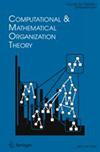Collaboration of Firms With New Forms of Organizing: Extending the Relational View
IF 1.5
4区 管理学
Q3 COMPUTER SCIENCE, INTERDISCIPLINARY APPLICATIONS
Computational and Mathematical Organization Theory
Pub Date : 2022-10-01
DOI:10.1177/26317877221131586
引用次数: 1
Abstract
New forms of organizing (NFOs) such as crowds and communities are increasingly relevant as novel collaboration partners for organizations. Although the motivations and goals that prompt organizations to collaborate (the why) have not changed over time, the way they collaborate (the how) seems to have changed significantly. Surprisingly, research to theorize these new forms of collaboration is still sparse. This conceptual paper investigates the extent to which a widely established theoretical framework—the relational view—can capture this new and mostly undertheorized setting of firm–NFO collaborations. More precisely, we ask whether and how the relational view also applies to this new context of interaction between firms and NFOs. Adopting the relational view’s four determinants as a framework, we systematically analyse and disentangle firms’ collaborations with NFOs. We ground this investigation in two analytical dimensions, the degree of NFO self-organizing and the degree of firm-relatedness. They enable us to exemplify the variety of new forms of collaboration and, most important, to delineate clear differences between firm–NFO collaboration and traditional interorganizational collaboration. We stress the boundaries of the relational view, suggest expanding its scope to capture the variety of firm–NFO collaborations, and propose ways of doing so.新型组织形式下的企业合作:关系视角的扩展
新的组织形式(nfo),如群体和社区,正日益成为组织的新型合作伙伴。尽管促使组织协作的动机和目标(为什么)没有随着时间的推移而改变,但他们协作的方式(如何)似乎发生了重大变化。令人惊讶的是,将这些新形式的合作理论化的研究仍然很少。这篇概念性的论文调查了一个广泛建立的理论框架——关系观点——在多大程度上可以捕捉到这种新的、大多是理论化不足的企业-非政府组织合作环境。更准确地说,我们要问的是,关系观点是否以及如何也适用于企业与非营利组织之间互动的这种新背景。采用关系观的四个决定因素作为框架,我们系统地分析和理清了企业与nfo的合作关系。我们在两个分析维度上进行了调查,即非营利组织的自组织程度和企业关联程度。它们使我们能够举例说明各种新形式的合作,最重要的是,描绘出公司-非政府组织合作与传统组织间合作之间的明确区别。我们强调了关系观的边界,建议扩大其范围以捕捉企业与非政府组织合作的多样性,并提出了这样做的方法。
本文章由计算机程序翻译,如有差异,请以英文原文为准。
求助全文
约1分钟内获得全文
求助全文
来源期刊

Computational and Mathematical Organization Theory
COMPUTER SCIENCE, INTERDISCIPLINARY APPLICATIONS-MATHEMATICS, INTERDISCIPLINARY APPLICATIONS
CiteScore
3.80
自引率
16.70%
发文量
14
审稿时长
>12 weeks
期刊介绍:
Computational and Mathematical Organization Theory provides an international forum for interdisciplinary research that combines computation, organizations and society. The goal is to advance the state of science in formal reasoning, analysis, and system building drawing on and encouraging advances in areas at the confluence of social networks, artificial intelligence, complexity, machine learning, sociology, business, political science, economics, and operations research. The papers in this journal will lead to the development of newtheories that explain and predict the behaviour of complex adaptive systems, new computational models and technologies that are responsible to society, business, policy, and law, new methods for integrating data, computational models, analysis and visualization techniques.
Various types of papers and underlying research are welcome. Papers presenting, validating, or applying models and/or computational techniques, new algorithms, dynamic metrics for networks and complex systems and papers comparing, contrasting and docking computational models are strongly encouraged. Both applied and theoretical work is strongly encouraged. The editors encourage theoretical research on fundamental principles of social behaviour such as coordination, cooperation, evolution, and destabilization. The editors encourage applied research representing actual organizational or policy problems that can be addressed using computational tools. Work related to fundamental concepts, corporate, military or intelligence issues are welcome.
 求助内容:
求助内容: 应助结果提醒方式:
应助结果提醒方式:


